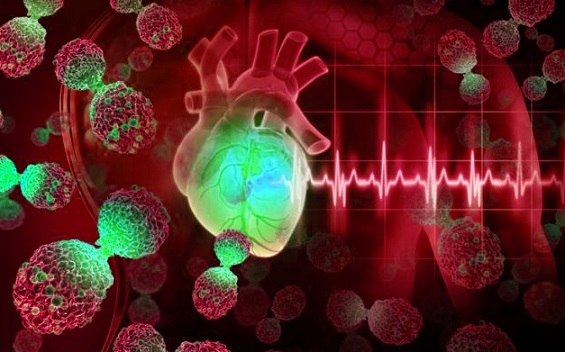American Study Discovers That COVID-19 Alters Heart Glycosylation Leading to Potential Cardiac Complications!
Nikhil Prasad Fact checked by:Thailand Medical News Team Feb 23, 2025 1 month, 3 weeks, 5 days, 14 hours, 7 minutes ago
Medical News: A groundbreaking study has revealed that COVID-19 causes significant changes in the heart's glycosylation process, which could contribute to heart complications in infected individuals. Researchers from the University of Nebraska Medical Center-USA and the Medical College of Wisconsin-USA conducted an in-depth investigation to understand how the coronavirus alters N-glycosylation, a crucial process for cardiac function. Their findings offer insights into the molecular disruptions caused by the virus and could pave the way for future therapeutic strategies.
 COVID-19 Alters Heart Glycosylation Leading to Potential Cardiac Complications
The Importance of Glycosylation in the Human Heart
COVID-19 Alters Heart Glycosylation Leading to Potential Cardiac Complications
The Importance of Glycosylation in the Human Heart
Glycosylation is a biological process in which sugar molecules attach to proteins, influencing their stability and function. This modification plays a key role in various cellular activities, including immune responses, protein transport, and maintaining organ health. In the heart, glycosylation is essential for regulating electrical conductivity, cardiac output, and overall function. Disruptions in this process can lead to severe complications such as arrhythmias, cardiomyopathy, and heart failure. This
Medical News report explores the critical findings of the study and their implications for public health.
How the Study Was Conducted
To analyze the effects of COVID-19 on cardiac glycosylation, the researchers integrated multiple advanced techniques, including single-nuclei RNA sequencing, mass spectrometry-based glycomics, and lectin-based tissue imaging. By studying tissue samples from deceased COVID-19 patients and comparing them with non-infected individuals, the team was able to identify significant changes in glycosylation patterns. The study focused on N-glycan structures, which are essential for protein function in the heart.
Key Findings of the Study
One of the most striking discoveries was the reduction in high mannose and paucimannose glycans in the hearts of COVID-19 patients. These specific glycans play an important role in maintaining cardiac function, and their depletion suggests that COVID-19 significantly impacts the heart’s biochemical environment. Researchers also found alterations in glycosylation enzymes, which are responsible for modifying glycans and regulating their function.
The study revealed that:
-The percentage of high mannose glycans in cardiomyocytes dropped significantly in COVID-19 patients compared to non-infected individuals.
-Paucimannose glycans, which may be linked to lysosomal function, were also reduced, possibly contributing to viral replication and cardiac stress.
-Altered glycosylation patterns were independent of age, sex, or other pre-existing conditions, suggesting that these changes are directly related to COVID-19 infection.
These findings indicate that COVID-19 not only affects lung and immune functio
n but also has a profound impact on heart glycosylation, which may contribute to the cardiac complications observed in many infected individuals.
Implications for Heart Health
The alterations in glycosylation observed in COVID-19 patients could explain why many individuals experience heart complications after infection. Disruptions in glycan structures can lead to:
-Impaired electrical signaling, increasing the risk of arrhythmias
-Reduced cardiac output, which may result in heart failure
-Weakened immune responses, making the heart more susceptible to inflammation and damage
By understanding these molecular changes, researchers hope to develop targeted therapies that could prevent or reverse COVID-19-induced heart damage.
Possible Therapeutic Approaches
Given the critical role of glycosylation in heart function, scientists are exploring potential treatments that could correct the disruptions caused by COVID-19. Some possible strategies include:
-Targeting Glycosylation Enzymes: Since COVID-19 affects glycosylation enzymes, therapies that regulate these enzymes could help restore normal glycan patterns.
-Autophagy-Lysosome Pathway Modulation: Researchers suggest that manipulating the lysosome system, which is involved in glycan processing, could offer a way to counteract the virus’s effects on heart cells.
-Glycan-Based Therapeutics: Certain drugs that mimic or replace lost glycans may help in restoring cardiac function and preventing complications.
Further research is needed to validate these approaches and develop effective treatments for COVID-19-related heart conditions.
Conclusion
The study provides crucial insights into how COVID-19 alters heart function at a molecular level. By affecting glycosylation, the virus disrupts essential processes in cardiac cells, potentially leading to long-term complications. The research highlights the need for targeted therapeutic strategies to mitigate these effects and protect heart health in COVID-19 patients. As scientists continue to explore the implications of these findings, future treatments may focus on restoring normal glycosylation patterns to prevent heart-related complications in affected individuals.
The study findings were published in the peer-reviewed journal: Cellular and Molecular Life Sciences
https://www.sciencedirect.com/science/article/pii/S1535947625000271
For the latest COVID-19 News, keep on logging to Thailand
Medical News.
Read Also:
https://www.thailandmedical.news/news/groundbreaking-german-study-reveals-how-sars-cov-2-alters-respiratory-tract-glycosylation-patterns-in-hamsters
https://www.thailandmedical.news/news/neuropilin-one-glycosylation-role-in-covid-19-infection
https://www.thailandmedical.news/news/sars-cov-2-xec-variant-shows-enhanced-immune-evasion-through-ntd-glycosylation
https://www.thailandmedical.news/news/covid-19-news-foods-rich-in-xesias-neu5gc-contributes-to-xenosialylation-that-causes-worse-outcomes-in-sars-cov-2-infections-and-vaccination
https://www.thailandmedical.news/articles/coronavirus
https://www.thailandmedical.news/pages/thailand_doctors_listings
